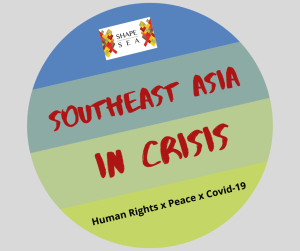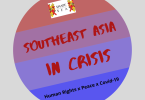Rashid AtingResearcher at Social Wellbeing Research Centre, Faculty of Economics and Administration, University of Malaya, Kuala Lumpur. This piece of work strictly represents the author’s personal view, and has not been written on behalf of any institution or organization. The author can be reached through his e-mail:rashid_ating@um.edu.my
 Amid the outbreak of Covid-19, the Malaysian government under Prime Minister Muhyiddin Yassin has announced two different economic stimulus packages. The first one is a total of RM250 billion ($57 billion) on March 27th 2020 (ASEAN Briefing, 2020a) and the second is a stimulus package of RM10 billion ($2.3 billion) on April 6th 2020 (ASEAN Briefing, 2020b). The Prihatin Rakyat Economic Stimulus program (PRIHATIN) broadly aims to provide social support in the form of cash incentives for marginalised households (MOF, 2020).
Amid the outbreak of Covid-19, the Malaysian government under Prime Minister Muhyiddin Yassin has announced two different economic stimulus packages. The first one is a total of RM250 billion ($57 billion) on March 27th 2020 (ASEAN Briefing, 2020a) and the second is a stimulus package of RM10 billion ($2.3 billion) on April 6th 2020 (ASEAN Briefing, 2020b). The Prihatin Rakyat Economic Stimulus program (PRIHATIN) broadly aims to provide social support in the form of cash incentives for marginalised households (MOF, 2020).
The PRIHATIN was launched with three main objectives targeting three groups: protect and support citizens, businesses and the economy (MOF, 2020) to ensure an equilibrium point achieved between curbing the outbreak and promoting the well-being of citizens. To realize this vision, protecting citizens should be the priority and the government cannot act stingily at this time. In the meantime, subsequent stimulus packages need to crafted as the existing now might be insufficient for the citizens as articulated by an economist, Muhammad Abdul Khalid on 22 March 2020 (Malaysiakini, 2020). It is also important to ensure that no one is left behind during the crisis as most of the vulnerable groups come from informal workers, fishermen, daily paid workers, for instance, those in poultry, electronics, food processing industries, and small food operators (Mansor, 2020).Nevertheless, the Malaysian government has come under heavy scrutiny about its treatment of non-citizens, particularly migrant workers and refugees. As we know, the government stimulus package only acts as a short-term cushion to assist migrant workers and refugees. With the extended movement control order (MCO), which later changed to a conditional movement control order (CMCO) that has lasted for more than a month, sustaining livelihoods has become a challenge for everyone, especially non-citizens, living through Covid-19. In this light, the government is compelled to provide good care and shelters instead of detaining and accusing them of spreading the virus.Malaysia is the temporary shelter for around 5.5 million migrants and 3.3 million undocumented workers, most of whom come from developing Asian countries such as Indonesia, Nepal, Bangladesh, and the Philippines (South China Morning Post, 2020a). These medium and low-skilled workers constitute around 31.3% (or 7,103,000 workers) of the total labour workforce in Malaysia (DOSM, 2019). With the large chunk of the economic stimulus dedicated for the recovery of the health sector and local economy, only a small portion of this government assistance goes to migrants through a different avenue.To overcome this, migrants are left to look after each other with the support of non-government organisations (NGOs) and concerned individuals. For instance, several human rights NGOs collaborated with the Welfare Department in providing food aid through a programme called “Our Journey†(South China Morning Post, 2020b). Some other local NGOs worked with Nahdlatul Ulama, the large Islamic organization movement in Indonesia, to assist Indonesian workers living in Kuala Lumpur and neighbouring states (South China Morning Post, 2020c).However, these efforts are insufficient, as migrant workers and refugees continue to struggle for survival every day. In this current situation, they are still unable to work, thus losing their source of income, and this makes them unable to meet their daily needs and monthly commitments such as house rent payments and remittances for their families. As Malaysians, we need to accept the fact that the economic stimulus package both marginalises and violates the migrants’ human rights. They are also eligible to receive social support during this time regardless of their nationalities (CIVICUS, 2020). An issue of the double standard should be put aside because Malaysia heavily relies upon their services for certain sectors such as construction and manufacturing.To conclude, the implementation of the MCO and later the CMCO has its pros and cons in Malaysia. On one hand, they help to curb the outbreak from spreading widely around the community, and have now shown some positive results. Nevertheless, it comes with a price, with the country suffering an economic downturn in which people and immigrants lose their source of income (South China Morning Post, 2020d). In the worst-case scenario, Malaysia will be faced with a recession after suffering the decline in economic growth from a 2% drop to 3-4% (IMF, 2020; New Straits Times, 2020). This outbreak is projected to continue to spread across the globe. One study (SUTD, 2020) predicts Malaysia could almost be free from this outbreak at the end of May 2020 (SUTD, 2020). In order to rebuild Malaysia’s economy, the role of these migrant workers is imperative to expedite the process. As Malaysia has been put in a bad light of how we treat migrant workers, in the long-term, the Malaysian government needs to come up with a better protection mechanism for the migrant workers and recognize their rights as human beings.
References
ASEAN Briefing. (2020a), “Malaysia Issues Stimulus Package to Combat COVID-19 Impactâ€, https://www.aseanbriefing.com/news/malaysia-issues-stimulus-package-combat-covid-19-impact/, access on April 26, 2020.ASEAN Briefing. (2020b), “Malaysia Issues Second Stimulus Package to Combat COVID-19: Salient Features†https://www.aseanbriefing.com/news/malaysia-issues-second-stimulus-package-combat-covid-19-salient-features/, access on April 26, 2020.CIVICUS. (2020), “MALAYSIA: ‘Migrants are amongst the first to be victimised and discriminated during the pandemicâ€, https://www.civicus.org/index.php/media-resources/news/interviews/4389-malaysia-migrants-are-amongst-the-first-to-be-victimised-and-discriminated-during-the-pandemic, access on May 3, 2020.DOSM. (2019), “Labour Force Survey Report, Malaysia, 2019â€, https://www.dosm.gov.my/v1/index.php?r=column/cthemeByCat&cat=126&bul_id=TlVMbEtBVXBGTi80VjdqZ1JUdVRHdz09&menu_id=U3VPMldoYUxzVzFaYmNkWXZteGduZz09, access on May 3, 2020.International Monetary Fund IMF. (2020), “World Economic Outlook, April 2020â€, https://www.imf.org/external/datamapper/profile/MYS, access on May 5, 2020.Norma Mansor. (2020), “How to ensure no one is left outâ€, retrieved from https://www.nst.com.my/opinion/columnists/2020/04/581590/how-ensure-no-one-left-out, access on April 26, 2020.Malaysiakini. (2020), “Don’t be stingy, economist tells gov’t in facing Covid-19 crisis, https://www.malaysiakini.com/news/516151, access on April 26, 2020.Malaymail. (2020), “KL’s migrant workers look out for each other in a sombre Ramadan marred by Covid-19â€, https://www.malaymail.com/news/malaysia/2020/05/02/kls-migrant-workers-look-out-for-each-other-in-a-sombre-ramadan-marred-by-c/1862226, access on May 3, 2020.New Straits Times. (2020), ” Malaysia facing a worst economic recession in its history” https://www.nst.com.my/news/nation/2020/05/589338/malaysia-facing-worst-economic-recession-its-history, access on May 5, 2020.Ministry of Finance Malaysia. MOF (2020), “Prihatin Rakyat Economic Stimulus Package (PRIHATIN)†https://www.treasury.gov.my/pdf/Booklet-PRIHATIN-EN.pdf, access on April 26, 2020.South China Morning Post. (2020a), “Coronavirus: for Malaysia’s migrant workers, lack of food is a bigger worry than Covid-19â€, https://www.scmp.com/week-asia/health-environment/article/3081310/coronavirus-malaysias-migrant-workers-lack-food-bigger, access on May 3, 2020.South China Morning Post. (2020b), “Coronavirus Malaysia: lockdown leaves migrants isolated; indigenous ‘heading back to the forestsâ€, https://www.scmp.com/week-asia/health-environment/article/3078440/coronavirus-malaysia-lockdown-leaves-migrants-isolated, access on May 3, 2020.South China Morning Post. (2020c), “One million Indonesian migrants in Malaysia lack food under lockdown, says Nahdlatul Ulamaâ€, https://www.scmp.com/week-asia/people/article/3081263/one-million-indonesian-migrants-malaysia-lack-food-under-lockdown, access on May 3, 2020.South China Morning Post. (2020d), “Malaysia says it has flattened the Covid-19 curve. But at what costâ€, https://www.scmp.com/week-asia/health-environment/article/3082363/malaysia-says-it-has-flattened-covid-19-curve-what, access on May 3, 2020.SUTD. (2020), “Predictive Monitoring of COVID-19â€, https://ddi.sutd.edu.sg, access on May 3, 2020.  Â





